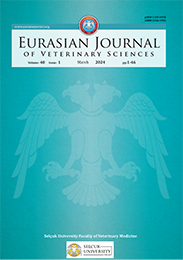| 2023, Cilt 39, Sayı 2, Sayfa(lar) 068-076 |
| [ Türkçe Özet ] [ Tam Metin ] [ PDF ] [ Benzer Makaleler ] |
| Effect of grape seed extract on β -catenin gene expression and hyperglycemia in rats induced by streptozotocin |
| Elif Gulbahce-Mutlu1, Emine Arslan2, Hilal Arikoglu3 |
| 1KTO Karatay University, Faculty of Medicine, Department of Medical Biology, Konya, Türkiye 2Selcuk University, Faculty of Science, Department of Biology, Konya, Türkiye 3Selçuk University, Faculty of Medicine, Department of Medical Biology, Konya, Türkiye |
| Keywords: β -catenin, type 2 diabetes mellitus, gene expression, streptozotocin, grape seed extract |
| Downloaded:350 - Viewed: 745 |
|
Aim: Type 2 Diabetes Mellitus is a metabolic disorder characterized by
high blood sugar in case of insulin resistance and/or insulin deficiency or
insufficiency. The Wnt/β -catenin signaling pathway plays a role in in all
physiological processes. Any defect in the pathway causes diabetes to develop.
The aim of this study was to determine the effect of grape seed extract (GSE) on
body weight, blood glucose and expression of β -catenin gene in experimental
Type 2 diabetic rats.
Materials and Methods: Rats were divided into five groups as Control, Diabetic Control and Treatment groups (100, 200, 400 mg/kg GSE). The rats in the diabetes and treatment groups were fed with high-fat diet and were administered low dose of streptozotocin (35 mg/kg). Body weights of the rats were recorded weekly during the experiment. The water-soluble extracts were administered by gavage for four weeks and liver, pancreas and blood samples taken from animals at the end of treatment were used in the study. Results: It was observed that the effect of GSE treatment on overall weight loss due to diabetes was minimal, and 100 and 400 mg/kg GSE doses lowered blood sugar (p<0.05). According to the results of β -catenin gene expression, there was no statistically significant difference between the groups in liver tissue (p>0.05) and pancreatic tissue (p<0.05). Conclusion: According to the findings, grape seed may be promising in the treatment of diabetes. |
| [ Türkçe Özet ] [ Tam Metin ] [ PDF ] [ Benzer Makaleler ] |




